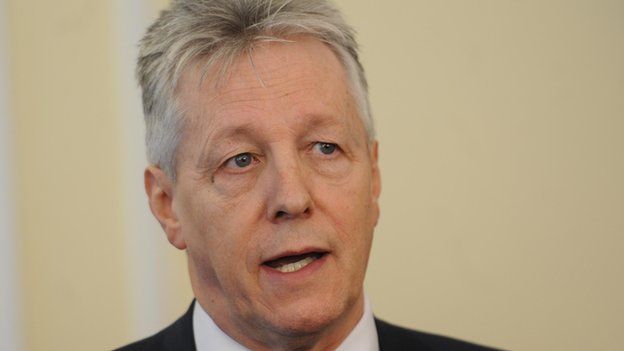DUP releases hung parliament plan
- Published

The DUP has issued a five-point plan it will use as part of any negotiations in the event of a hung parliament after the general election in May.
The document was released at the party's policy conference in Templepatrick in County Antrim.
It includes a demand to scrap the so-called bedroom tax.
Party leader Peter Robinson refused to say how much extra money the party would be asking for.
He also said that his MP Ian Paisley was misquoted in a national newspaper when it stated that the DUP would be seeking another £1bn in funding.
Addressing the possibility of a hung parliament, Mr Robinson told the conference: "Our position after the election is clear.
"Our goal is not to achieve anything for our party or ourselves, but for Northern Ireland as a whole.
"We will not seek, nor would we accept, any role in government but we would demand a good deal for Northern Ireland."
Mr Robinson also again laid the blame for the Stormont impasse on welfare reform on Sinn Féin.
He said that a massive breakthrough had been achieved in December that created the potential for long-term financial stability, but that Sinn Féin had gone back on what they had agreed.
"Delivery remained on track right up to a few weeks ago when, out of the blue, we were asked to believe that someone turned the lights on in Connolly House [Sinn Féin headquarters] and Sinn Féin suddenly realised that what they had negotiated and agreed was not what they thought they had signed up to.
"This represented either an alarming act of bad faith by Sinn Féin or the most inept negotiating by republicans in the history of the process."
Sinn Féin MP Michelle Gildernew said her party had "stood against the Tory assault on public services and the welfare state".
"We have consistently and publicly declared our determination to protect children and adults with disabilities, the long-term sick and families with children against Tory cuts," she said.
"That was our position before, during and since the Stormont House Agreement. That remains our position."
- Published18 March 2015
- Published18 March 2015
- Published5 March 2015
- Published21 February 2015